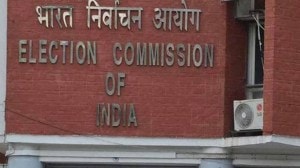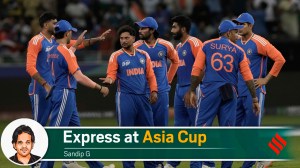Help us end J&K terror: Pak new line
Pakistan has reiterated that it would be willing to use its ‘‘influence’’ in Kashmir to end terrorism, but that India mu...

Pakistan has reiterated that it would be willing to use its ‘‘influence’’ in Kashmir to end terrorism, but that India must also create the conditions which will enable Islamabad to do so.
As bureaucrats from both sides wrapped up their deliberations today in the nearby hill resort of Murree, in which a nuclear restraint regime as well as the Kashmir issue are likely to top the reinvented composite dialogue agenda, Pak Foreign Minister Khurshid Mehmood Kasuri told The Indian Express that ‘‘it would be in Pakistan’s interest that Kashmir pacifies once the talks start and there is peace in the Valley.’’
Kasuri was echoing what has widely come to be accepted by a large number of strategic thinkers, people in the Islamabad establishment as well as among Kashmiris. That President Musharraf’s order to ‘‘end the jehad’’ across the Line of Control in the Kashmir valley is for real, that it is already having a salutary effect in that infiltration has come down considerably, as well as the fact that Islamabad is now looking at New Delhi to ‘‘create conditions’’ that will help reinforce its recent order.
Kasuri was not willing to be drawn into details of what he would like New Delhi to do, reluctantly pointing out that it was also in India’s interest to ‘‘end human rights violations in the Valley.’’ He said that would have ‘‘an enormous impact’’ on the Pakistani people as well as the large Kashmiri constituency across the country ‘‘which was impossible to ignore.’’
Kasuri said he was very happy with the manner in which the current talks had taken place—Foreign Secretaries Shashank and Riaz Khokhar will wrap up this round tomorrow by announcing time-frames and modalities—and that Pakistan was committed to discussing all issues, ‘‘without full stops and commas.’’
Kasuri added: ‘‘We have to come to grips with reality. We have to stop hurting each other.’’
Meanwhile, it is learnt that a Pakistani proposal to discuss a ‘‘strategic restraint regime’’ in which both sides could also discuss nuclear deterrence has also been placed on the table. Such a proposal is essentially a rewrite of the Lahore 1999 MOU on nuclear CBMs, with the additional proviso that when it is discussed at the Foreign Secretary-level, officials on both sides with an expertise on nuclear affairs, will also attend the meeting.
Officials from both sides also declined to comment on moves each of them could make to take forward the ‘‘process’’ of dialogue on Kashmir, saying that this did not form part of the ‘‘substance’’ of the current round of talks.
|
No Indian security for
Pak tour: Advani |
|||||
|
NEW DELHI: Deputy Prime Minister L K Advani on Tuesday denied there were plans to send securitymen with the Indian cricket team to Pakistan.‘‘I have seen such reports. No Indian security official will travel with the Indian cricket team to Pakistan.’’ Advani said it was for the Pakistanis to provide security to the Indian team. |
|||||
But sources confirmed that Islamabad would very much like New Delhi scale down troops in the valley and at least replace those guarding the LoC with paramilitary forces such as the BSF and the CRPF. In turn, even as New Delhi is, in principle, prepared to look at these suggestions, it would like a complete and guaranteed end to cross-border infiltration.
The Foreign Minister’s argument of needing New Delhi’s help ‘‘to resolve Kashmir’’ has been echoed again and again here over the last few days. Analysts and officials have pointed to the ‘‘fundamental change’’ that has been in the making in Pakistan over recent months, comparing this turnaround in Kashmir to the one that Musharraf made on Afghanistan under pressure by the US after 9/11.
Mahmud Durrani, a retired major-general involved in the Track II process between India and Pakistan pointed out that India’s ‘‘coercive diplomacy’’ of mobilising its forces on the border on most of 2002, when the average Pakistani lived under the constant war, international pressure after 9/11 as well as the nuclearisation of the sub-continent, were catalysts for persuading Musharraf to call for an end to the Kashmiri jehad.
Kasuri admitted that the Pakistani government was in touch ‘‘with all sides’’ in Kashmir, even though it believed that the group led by Geelani was the largest group there, that ‘‘we will nevr sell you, keep you engaged and try and find a solution that is acceptable.’’
In this respect, he said, India should take advantage of the fact that President Musharraf, ‘‘an elected President who happens for another year to be chief of army staff,’’ is in power in Pakistan. Describing it as a ‘‘window of opportunity’’ for India to come to an agreement,
Kasuri also hastened to add that he was not ‘‘laying down any time-lines or preconditions, but was only talking common sense.’’
Photos



- 01
- 02
- 03
- 04
- 05



























